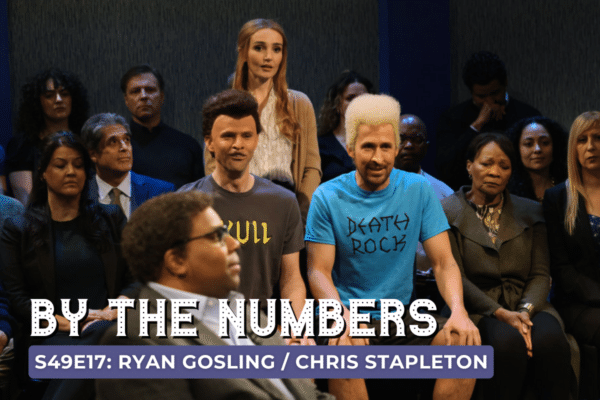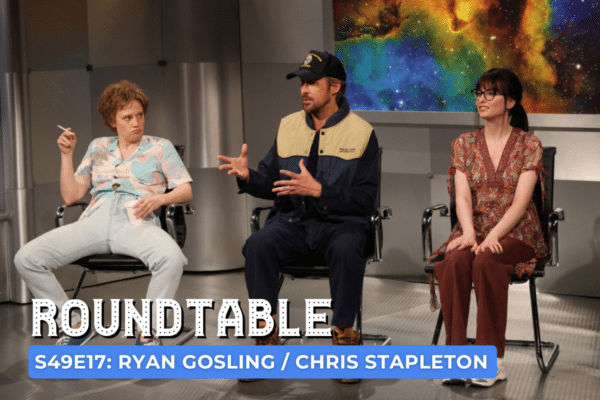
After you’ve been a late-night comedy writer grinding out 80 to 100 monologue jokes a day to the point where you feel worn down to a gibbering brain stem, what do you do?
If you are Stephen Levinson, you join an ad agency in Dayton, Ohio in order to keep you and your family sustained and healthy—and to satisfy that jones to still be funny, you invent a podcast that re-creates blockbuster movies as completely unhinged and likely unpublishable “novelizations,” a la the quickie paperback versions of every iteration of Star Wars that filled drug store shelves in the 70’s and 80’s.
Then you invite other refugees from late night and other comedy-writing venues to join in, recruit an unlikely phalanx of genuinely famous comedy performers to do the “narrating” of chapters of your faux novels, and you end up with a funny and buzzy comedy podcast called “The Novelizers.”
It’s a place where parts of Star Trek II: The Wrath of Khan get turned into Groundhog Day, or a musical; and a section of Independence Day is told by the dog.
Levinson is definitely enjoying his podcast as much (if not more) than he did his days on the writing staff of The Tonight Show.
“If you have spent a few years writing in Jimmy Fallon’s voice,” Levinson says, “now you’re writing for yourself and what you think is funny. That’s the fun of it.”
That simple formula clearly has appeal. It has attracted a roster of past and current late-night writers ranging from David Javerbaum (former showrunner of The Colbert Report), Josh Lieb (former Fallon show runner), Allison Silverman (former Colbert head writer), Rob Kutner (former Conan writer), Jo Firestone (former Fallon writer), and a wide klatch of others.
Their task is markedly different from what is expected/demanded on late-night shows. “Some of them really write well in prose,” Levinson says of his writing crew, and they enjoy getting away from what he calls the “joke, joke, joke” approach of the late-night world.
The performers serving as “narrators” have also embraced the format, which Levinson uses sharp emphasis to underscore should be defined as parody. “I would call it a parody—especially if any lawyers for the studios are listening.”
As for just the regular listeners, they’ll hear a lot of familiar voices.
The show’s first two seasons were hosted by Andy Richter. Rob Delany of Catastrophe, narrated a chapter. So did J K Simmons, Beanie Feldstein, Patton Oswalt, Rachel Bloom, Paget Brewster, Jake Johnson and all kinds of names from late night–including the caustic canine Triumph (as told by his legendary “handler” Robert Smigel of SNL and Conan), John Hodgman (The Daily Show), Will Forte (SNL), and Craig Ferguson (of The Late Late Show”). Plus Dick Cavett—who’s more late night than Dick Cavett?
Why is this project so attractive to late-night veterans? “I think it’s pop culture,” Levinson says. “Late night is into pop culture. And it’s work on deadline. People in late night just know how to turn around content for a daily show. I think that’s what works here.”
Levinson himself has familiar check points in his backstory—starting with an interest in comedy writing at a young age. “I got a little TV for my Bar Mitzvah and I started watching David Letterman,” he says. “That was like my dream job. And then I got one and it kicked my ass.”
Oh come on. Getting paid to write jokes? Working in glamorous Rockefeller Center?
“It’s such a tough job,” Levinson says. “OK. It’s not defusing bombs, but it wears you down.”
Some late-night shows ask their monologue writers to churn out perhaps as many as 50 jokes a day. Fallon’s Tonight Show was “definitely into quantity,” Levinson says. “Eighty to 100 jokes a day. After tapings I would come home, give my kids a kiss and then stay up late writing. Before I headed off for work I would write. I was never not writing. When I wasn’t writing and I was just talking to people, jokes were in the back of my head.”
And of course, “it’s competitive.” Levinson says. “Jimmy’s monologues are short. When my jokes were on the show I was on the edge of my seat praying that they didn’t flop. You’re only as good as your last joke.”
On “The Novelizers” it’s all different. Writers are given complete chapters to work on and pretty much left to their own comedic instincts. “There is very little editing,” Levinson says. “I think it’s really refreshing for a comedy writer to have an assignment they can just do in their own voice.”
That has to be quite an attraction—because that level of freedom comes at a price. And the price is: $0.00.
Nobody gets paid. Not the writers, who tap the deep reserves of their creativity to decide just how much wrath Khan can dish out; nor the narrators who pull out characters and voices to make the scripts come alive.
“They get to promote their stuff,” Levinson says, describing a form of compensation particular to show business.
Then of course, there is the personal enjoyment involved, though that’s far less common a motivation in show business.
So far the formula is working well. Writers continue to express interest, Levinson says, and actors and comics continue to raise their hands to get involved.
Ambition is running high. The show’s current season is a novelization of The Matrix, and Levinson says the next two will dive into Dirty Dancing and Batman: The Dark Knight.
The more iconic the movie, the funnier the jokes, Levinson suggests. “It’s not like My Dinner with Andre would work,” he says, before the joke potential kicks in. “Well, maybe it would!”
“The Novelizers” is available wherever you get your podcasts, or at beacons.ai/thenovelizers










